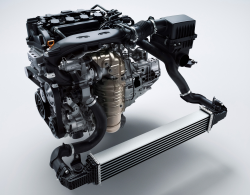
— Honda oil dilution problems have caused a class action lawsuit that alleges vehicles equipped with 1.5-liter gasoline direct injection engines have defects that cause fuel to mix with oil.
The lawsuit says 2019-2023 Honda CR-V, 2019-2022 Honda Civic and 2018-2022 Honda Accord vehicles allegedly stall and suffer engine failures.
The Honda oil dilution class action lawsuit was filed by two customers.
Illinois plaintiff Eliyahu Wolf purchased a new 2020 Honda Civic and has brought his Civic to the dealership for "routine oil changes and maintenance two times since his purchase of the vehicle." The plaintiff also says he brought his vehicle to a different Honda dealer twice for maintenance.
Even though dealer technicians always said his Honda Civic was working fine and had no problems, the plaintiff claims he "does not have a vehicle that is safe or reliable as advertised by Honda."
Iowa plaintiff Miranda Phelps purchased a new 2021 Honda CR-V, and in January 2022 the check engine light illuminated indicating an alleged emissions system problem.
Phelps says she also smelled strong exhaust outside of the vehicle. She says she took the CR-V to a non-Honda service shop and technicians cleared the light.
But in February the vehicle began emitting smoke and went into “limp mode” while she was driving to work. The lawsuit alleges she had the Honda towed to a Honda dealer where technicians found fuel in the vehicle oil.
The plaintiff says technicians inspected the Honda for "the source of the problem, reportedly found no other issues, changed the oil, and tried to burn the excess fuel out of the engine system."
According to the class action, the Honda CR-V went into limp mode in March about three hours away from home.
The plaintiff says she had the CR-V towed to a Honda dealer where technicians performed a cylinder test and “all injectors passed,” performed a software update, ensured the “engine no longer [misfires],” and test drove to confirm “all is well.”
A little over a week later the CR-V again entered limp mode while she was on her way to work. She had the vehicle towed to a dealer where technicians allegedly said the oil level was “2 inches too high on stick.”
The oil dilution lawsuit says technician replaced the fuel injectors and changed the oil and noted “excessive fuel in oil.”
On April 18, plaintiff Phelps "noticed a noxious fuel smell coming from her vehicle and preemptively" brought the CR-V to a Honda dealer. Technicians confirmed the oil level was “about 1 inch[ ] above specs,” and “smell[ed] like gas.”
The technician ordered a new high pressure fuel pump and drained all the oil from the vehicle and replaced it with fresh oil.
The plaintiff says she took her vehicle to the dealer in May "out of concern that there was excessive oil in her fuel. Technicians confirmed this and replaced the high pressure fuel pump. The oil was drained again and replaced with fresh oil."
The class action lawsuit alleges the plaintiff "does not have a vehicle that is safe or reliable as advertised by Honda."
The Honda oil dilution lawsuit says all sorts of issues result from oil mixed with gas, including engine problems and wear, faulty engine lubrication, fuel odors and vehicles that enter limp mode. The Honda vehicles can also allegedly stall or suffer complete failures of the 1.5L engines.
According to the oil dilution class action, Honda hasn't offered permanent repairs and hasn't recalled the vehicles.
However, Honda has announced other actions in the past regarding oil dilution problems which you can read below.
The Honda oil dilution class action lawsuit was filed in the U.S. District Court for the Northern District of Illinois: Eliyahu Wolf et al., v. American Honda Motors Co., Inc.
The plaintiff is represented by Fegan Scott LLC, the Law Offices of David Freydin, and Shindler, Anderson, Goplerud & Weese PC.




